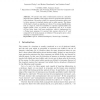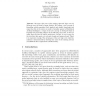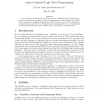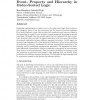133
click to vote
ISMIS
1994
Springer
15 years 6 months ago
1994
Springer
We assume that safety of information stored in a database depends on the reliability of the agents who have performed the insertions in the database. We present a logic S to repres...
163
Voted
AC
1992
Springer
15 years 6 months ago
1992
Springer
Logic and databases have gone a long way together since the advent of relational databases. Already the rst basic query languages for relational databases beside relational algebra...
116
Voted
DBPL
1993
Springer
15 years 6 months ago
1993
Springer
This paper presents database applications of the recently proposed Transaction Logic—an extension of classical predicate logic that accounts in a clean and declarative fashion f...
112
Voted
ALP
1994
Springer
15 years 6 months ago
1994
Springer
This paper introduces a logic for a class of properties - in particular variable aliasing - used in static analysis of logic programs. The logic is shown to be sound, complete and ...
120
Voted
ATAL
1997
Springer
15 years 6 months ago
1997
Springer
Abstract. We argue that none of the existing epistemic logics can adequately serve the needs of agent theories. We suggest a new concept of knowledge which generalizes both implici...
141
Voted
ISMVL
1997
IEEE
15 years 6 months ago
1997
IEEE
This paper shows how the application of a CMOS ternary logic is useful in the realisation of Delay Insensitive (01)asynchronous circuits. It is shown that fully DIasynchronous cir...
110
Voted
KR
1998
Springer
15 years 6 months ago
1998
Springer
This work is motivated by the existence of two useful but quite different knowledge representation formalisms, the situation calculus due to McCarthy, and the logic OL of only kno...
117
Voted
ECOOPW
1998
Springer
15 years 6 months ago
1998
Springer
It is our opinion that declaring aspects by means of a full- edged logic language has a fundamental advantage over using a restricted special purpose aspect language. As an illust...
115
Voted
LPNMR
1999
Springer
15 years 6 months ago
1999
Springer
Recently there has been increased interest in logic programming-based default reasoning approaches which are not using negation-as-failure in their object language. Instead, defau...
111
Voted
ICLP
1999
Springer
15 years 6 months ago
1999
Springer
Knowledge representation in logics, even in the order-sorted logic that includes a sort hierarchy, tends to lose the conciseness and the nuances of natural language. If we could c...




